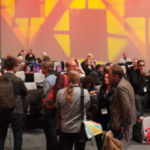When Richard Braman founded The Sedona Conference (TSC) in 1997, it was because he was tired of continuing legal education (CLE) as usual. Nearly 20 years later, his idea is the foundation for a portfolio of events and programs that aim not just to improve legal education but to fundamentally change the law as it’s interpreted and enforced.
Braman, who passed away two years ago, was an attorney with Gray Plant Mooty in Minneapolis when he bought a home in Sedona, Arizona, near the towering red rocks of the Sonoran Desert. He was a “very charismatic individual,” according to Craig Weinlein, TSC’s executive director and board chair. “A really deep thinker. He cared a lot about the legal profession.”
And he hated traditional CLE conferences. “You would see faculty that were just talking heads up there,” Weinlein said, “and attorneys [in attendance] who needed to be there, but they were working on their correspondence or doing crossword puzzles.”
In response, Braman founded TSC — a series of three legal conferences held every year in Sedona, each one dedicated to a specific area: anti-trust law, conflict litigation, and intellectual-property rights.
Braman wanted to replicate the college seminar experience where you have a small group of people who are really interested in the subject matter, exploring it on an advanced level.
They were based on a specific model. “[Braman] wanted to replicate the college-seminar experience,” Weinlein said, “where you have a small group of people who are really interested in the subject matter, exploring it on an advanced level, with someone that’s a professional facilitator or moderator. But everyone is sharing ideas and learning from each other.”
BEYOND SEDONA
TSC still offers those three conferences each year — they’re called the “regular season” — but they’re held all around the country now, usually drawing 60 to 70 attendees, plus 15 “dialogue leaders.” There’s also The Sedona Conference International Programme, which in June will present the 8th Annual Sedona Conference International Programme on Cross-Border Discovery & Data Protection Laws in Berlin.
In addition, the TSC Institute (TSCI) offers one- and two-day CLE programs featuring speakers and materials from TSC’s Working Group Series — including “eDiscovery Negotiation Training: Practical Cooperative Strategies,” held at the Washington, D.C., offices of Sidley Austin last month, during which Weinlein sat down with Convene.
But these days, the Working Group Series is where TSC expends much of its efforts. The program came about because, while the regular-season conferences were well received, they had no follow-up. “[Braman] along with some regular attendees said, ‘We need to do more,’” Weinlein said. “‘We need to take these issues we’re talking about at the conferences and see if we can actually come up with consensus solutions that will benefit everybody.’”
The first working group was created in 2002, and focused on electronic-document retention and production, a.k.a. e-discovery. There are 11 groups in all today, covering e-discovery as well as the role of economics in antitrust, mass torts and punitive damages, data security and privacy liability, and more. Like the regular-season conferences and TSCI’s programs, the groups are powered by small-scale dialogue.
“The working groups will take a tipping-point issue where members of the legal profession are looking for guidance,” Weinlein said. “The Sedona Conference will bring together all the stakeholders in the process, by which I mean lawyers who regularly represent the plaintiff side on an issue, lawyers who regularly represent the defense side, in-house counsel, government counsel, judges, academics, experts. We ask them to leave the advocacy at the door — because these people are trained to win — and engage in dialogue, not debate.”
CIVIL DISCOURSE
Each working group has anywhere from 200 to 800 members, and is guided by a steering committee with about a dozen people. The steering committee will appoint a draft team to prepare a commentary on an issue, which then will be discussed at an in-person meeting of the working group, with attendance ranging from 60 to 250 people. One commentary can go through several rounds of live markups.
“The in-person meetings of the working groups, where different commentaries in different stages of the process are presented, are probably the majority of [TSC’s] meetings,” Weinlein said. “They’re different from most other organizations’ meetings. The commentary is up on the screen. Someone’s talking about, should it be and, should it be or? There will be some sessions that are very granular. There will be some others that are very big-picture, but it’s still big-picture about the commentary.”
The groups operate based on perceived need; at any given time, about half are active while the others are dormant. The goal is to publish final versions of the written commentaries, sometimes presented as guidelines or best practices, and to have judges and legal scholars cite them in a way that effects real change in the law. “A program like this,” Weinlein said, “supports our mission of moving the law forward in a reasoned and just way.”
And it’s based on something that might seem to be going out of style, especially during this presidential-election cycle: civil discourse. “It’s not about people trying to win for their position,” Weinlein said. “People are supposed to go in there thinking, I come from a certain perspective and I’ve got certain views, but I have got to have an open mind. I’ve got to listen to others. I’ve got to be willing to see what I’m missing. The dialogue is critical to people just talking in a civilized way and with an open mind.”
THE SECOND RULE OF TSC
If the first rule of The Sedona Conference (TSC) is “dialogue, not debate,” the second is “what you say at Sedona stays at Sedona.” Almost everything that’s discussed during a TSC program is “completely off the grid,” according to TSC’s Craig Weinlein.
“If you’re going to have a true think-tank experience, where people don’t have to be concerned about their client’s position, their law firm’s position, their employer’s position — you have to have that rule of confidentiality,” Weinlein said. “As a corollary to that, there’s no audio recording in our meetings. There’s no live blogging of what people are saying. We just cannot permit any of that.”



